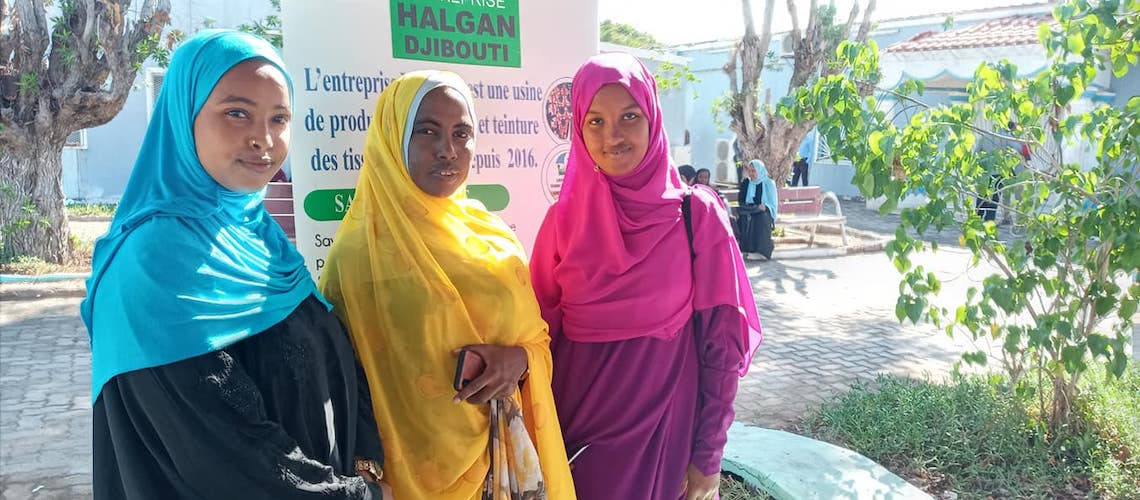 © Entreprise Halgan - Djibouti
© Entreprise Halgan - Djibouti
"Women’s entrepreneurship" can too often remain just words in development project papers. However, there are concrete ways to make a difference in online sales of women-owned businesses as well as their lives. Djibouti, where entrepreneurs used to be few and far between a few years ago, is a good example of how to improve women’s businesses. Several private sector development projects along with strong government support are helping to change the situation.
While 75% of informal businesses are run by women, only 15% of formally registered businesses are women-led. This is mostly because women face more hurdles than men when it comes to formal enterprises as women juggle a complex array of social, cultural and business roles. However, non-discriminatory legislation, a good one-stop shop for business registration and several support services, can enable women to thrive when it comes to trade and services.
In early 2020, e-Commerce support was still lacking in Djibouti. The Center for Leadership and Entrepreneurship (CLE), the Chamber of Commerce and the SME association, all local ventures, were dedicated to supporting private enterprise, providing business training, incubation, business support services, or support for access to finance. However, e-Commerce training was still missing from these services.
In 2017, the Women Entrepreneurs Finance Initiative (WeFi) program, a global initiative aimed to support women’s entrepreneurship was launched. In Djibouti, the program worked with the World Bank’s "Support to Women and Youth Entrepreneurs" project, implemented by the CLE. The WeFi program started in Djibouti with a simple target to enroll and support 32 women’s businesses and ensure growth through an e-Commerce strategy. It seemed rather simple at first, but that was not the case when it came to walking the talk. After much hard work, a year and a half later, businesses participating in the WeFi program had, on average, an overall turnover increase of 12% and an e-commerce generated turnover increase of 16%.

Three lessons can be drawn from this project to help women in Djibouti:
- Use of a global/local approach. Global knowledge and expertise were key to quickly understanding the local context and selecting proven methods to engage women entrepreneurs into the program. A global consulting firm with women in e-Commerce expertise worked with a local team. By embedding this work within the CLE, it could run an effective selection process, and use lessons learned from other countries to design a tailored program. Out of 100+ candidates, 32 businesses were selected to receive support.
Hassan, an entrepreneur in art and decorative products, boosted her projects and attracted more customers through the e-commerce training sessions. (Photo credit: © Galerie Oubah - Djibouti) - Operate a close-range, customized consulting service that stays the course. The project provided the 32 companies with a mix of collective training and individual consulting services and accompanied women CEOs all the way till they saw an increase in sales. A total of 18 collective 2-hour training sessions were offered, with 500 hours of individual business consulting (15 one-hour calls). That’s because every situation is different, and support needs to be tailored from basic marketing help to global platforms access. Oubah Hamoud Hassan, who produces and distributes art and decorative products, was happy with the support and said, "Attending the training sessions helped me get answers to all my questions on e-commerce. The individual coaching helped me to boost my project and attract more customers."
- Catalyzing on the local entrepreneurship ecosystem is paramount. Doing such a project as a stand-alone without the involvement of partners in the private sector would be pointless because no local capacity would be built to carry the SME support services after the two-year intervention period. In fact, the CLE, the Chamber of Commerce, and the SME association, were keen to engage from the get-go. An MoU was signed to jointly source and clear candidates through a transparent and fair process while linking the services to their own program.
Arafo Saleh Said, owner of the Victor Hugo bookshops chain in Djibouti, says it best, “I am using the WeFi training and consulting to create an online book shopping service,” she said. “But it’s only thanks to the certified accounting support center of the Chamber that I could free some of my business income to invest.” She said that the WeFi advisors and the CLE helped her design the business plan for her online store. Now, through her network of clients, and with support of the SME association, she hopes to become the Amazon of Djibouti. She’s right to be ambitious. The CLE and Chamber joined forces to offer business development services that make use of the WeFi techniques. It means her online endeavors will get the support needed for the long run.

Women CEOs still need support in many countries. However, we need programs that adapt to their needs, not the other way around. The WeFi Djibouti project adapted global lessons to local context and offered e-Commerce training coupled with customized consulting. The "boots on the ground" approach may seem costly and unscalable, but it is not. Local institutions can help ease implementation and ensure sustainability for such development programs.




Join the Conversation